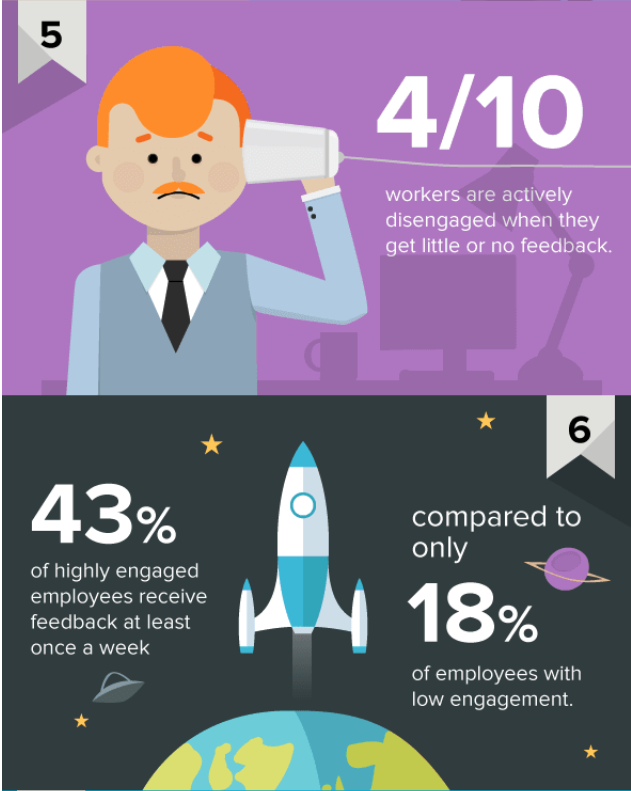It can be hard to assess your work and truly look at yourself critically.
We like to think we are doing the best we can and we know that we may have some areas to work on, but actually hearing what those things are may make us feel negative and defensive.
However, actively seeking out ways we can improve is important not only for your professional development but just for your growth as an individual.

Even though it can be hard to hear critical feedback about yourself, data shows that it is important for a functional working environment. A survey by Officevibe found some crucial statistics about the importance of giving and getting feedback in the workplace.
Importantly, they found that 4 out of 10 workers felt disengaged when they get little to no feedback. Despite the difficulty of hearing some things and really taking a hard look at yourself, it is necessary to become a better overall professional and not become disengaged from your work.

Images from the Office Vibe infographic on employee engagement. To see the full infographic, click here.
Although this post primarily focuses on how to get the feedback you may not already be getting, these tips can still be used if you are getting regular feedback. If you are already meeting regularly with someone to get this feedback, try to think of how some of this can be adjusted or incorporated into conversations that may already be happening.
Assess yourself first
Before seeking out others’ assessments of yourself, take a long look in the mirror to see if you can come up with your own self-assessment. And be honest with yourself: what are your shortcomings? Where can you improve? What are some areas you feel you could have performed better in?
It may seem arbitrary, but doing such a self-assessment could actually help when you hear other people’s perspectives. Although you certainly will hear some things that may challenge you and that you are unprepared for, a self-assessment could be a helpful exercise for preparing yourself for a potentially difficult conversation.
Some questions you might ask yourself include:
- What part of my job did I struggle with the most this year?
- Where do I see myself in 5 years? What can I be working on now to get ready for that point?
- How do I think other people see me?
- What do I think I’m good at?
- Am I being challenged and growing? Could I be doing more?
Who do you trust?
The next step in seeking out constructive feedback and areas of improvement is to identify who would be best to seek out. It doesn’t have to just be one person, and in fact, it is often better to get multiple perspectives! This feedback can come from a variety of sources: a supervisor, peer, colleague, or even a student who knows you well.
Keep in mind that depending on who you are seeking out feedback from, the perspective and feedback may vary. Your relationship with each person involved may be different, so the conversation can take different forms and apply to different areas of your personal and professional growth. For example, a supervisor may be able to speak to your administrative skills and competencies, but a student may not see that much of your performance in that area but could contribute in a different way.
Practice your listening
When gathering feedback about yourself, your first instinct may be to offer a rebuttal or get defensive. Try to ignore this instinct and instead, really practice your listening skills. Don’t listen to respond, but really take into consideration what is being said and reflect on some examples that may relate to what is being said and how you can really improve on that aspect of your performance.
Active listening can be practiced. Before seeking out critical feedback for your job, it may be helpful to do various exercises with a friend or trusted colleague. Virtual Speech has a variety of helpful active listening exercises that can help you prepare for important conversations before going into it. There are even virtual reality exercises you can do to help prepare you!
Remember: you are not your job
When hearing something about yourself that is less than positive, it can be easy to feel defensive or take it personally. However, remember that you are more than your job. Just because you have some areas to improve upon does not make you any less worthwhile as an individual.
It is ok to have areas to improve upon, everyone does! While you may have room for growth as a professional, remember all the other roles that you play in your life. Appreciate yourself and remember that you have lots of positive qualities in addition to any things you may have to improve upon.
After the feedback…
Don’t just take someone’s feedback and not incorporate it! After hearing different perspectives, come up with an action plan to incorporate the feedback into your job performance. Adding new tips and strategies will make you a better professional and strengthen your relationship with whoever gave you their perspective.
Come up with a strategy for how you will implement the things you received feedback about. Some ideas for how to implement and plan next steps include:
- Creating an online document or spreadsheet that lists out suggestions for improvement and 2-3 steps to take towards each
- Creating a vision board that has your starting point and where you want to get to
- Setting some dates on your calendar for certain benchmarks or steps you want to have taken by that point
- A printed out checklist to include on your desk where you can always see it
These methods and tips should give you a starting point to assess yourself (and have others assess you). Remember, ongoing feedback and constructive criticism are important parts of professional growth and are necessary for professionals.
Have a timeline for when you plan to get this feedback and incorporate it. I believe that it’s important to have 3-4 sessions a year in which you seek out ongoing critical feedback from someone.
If your institution is on a quarter system, this is pretty easy to do since you’ll be doing so at the end of each quarter! But if you are on a semester schedule, being more intentional and seeking to do such feedback a few times in addition to the end of the semester is essential.
The important thing is to find ways to continue to grow and incorporate advice into your ongoing growth.
How do you work to grow from feedback? Let us know on Twitter @themoderncampus and @Ruben_Market.





